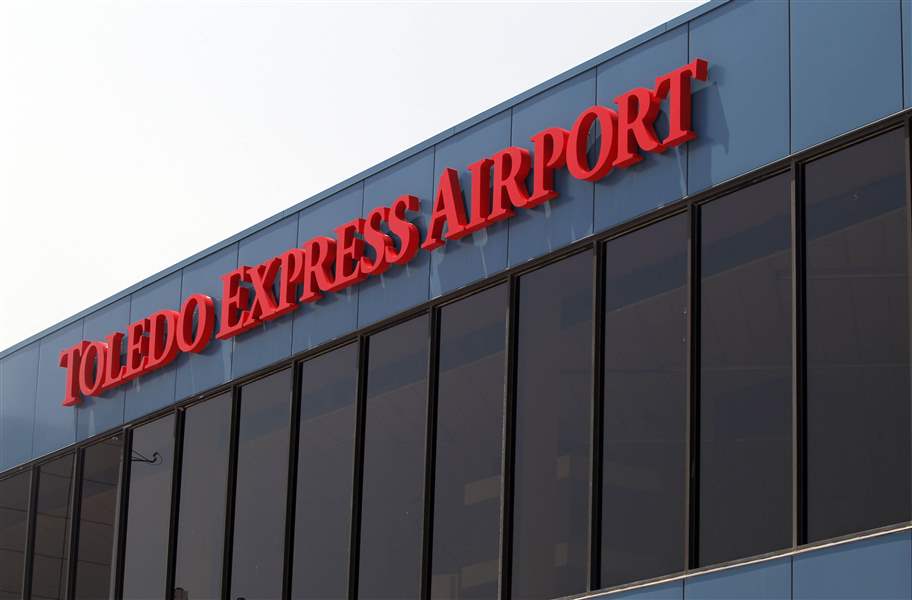
Port board backs plan to tax income in airport zone
3/1/2013
The Blade
Buy This Image

A proposed Joint Economic Development District surrounding Toledo Express Airport received a unanimous endorsement Thursday from the Toledo-Lucas County Port Authority, which operates the Toledo-owned airport and owns significant neighboring property.
If approved by Swanton and Monclova Townships and the city of Toledo, the district would collect an income tax from businesses and wage-earners on properties owned by the port authority, city, or anyone else who signs a petition for the district in a designated area near the airport.
District revenue would be distributed, on a sliding scale, to the district itself and to the three participating communities, with the district’s share to be used for improvements to the airport or to infrastructure serving the properties in the district.
The port authority board of directors’ 9-0 vote on Thursday authorized that agency to sign the petition to include the property it owns, which includes extensive holdings the agency bought during the 1990s, using federal funds, to mitigate the noise impact on nearby residents from the former Burlington Air Express cargo hub.
Port directors Opie Rollison, Margarita de Leon, Dr. Lloyd Jacobs, and Richard Gabel were absent.
Jerry Chabler, chairman of the port’s airport committee, said a special economic district near the airport has been under discussion for nearly two decades.
“We are two yards from the finish line, but I’m very confident we’ll be there,” said Calvin Lawshe, a former director of the Toledo-Lucas County Plan Commission. Mr. Lawshe has acted as a consultant for the port authority on developing the JEDD plan.
Mr. Lawshe and Matt Sapara, the port authority’s vice president for development, said the district’s purpose would be to provide funds both for the airport and to support business development nearby.
Mr. Sapara cited, as an example of a project the district could help pay for, a $1 million repaving project at the airport for which a 10 percent local match to federal funds is required.
District revenue would be used to “redevelop and reinvest in infrastructure at the airport” such as roads, runways, and utilities, he said.
“It is the future of public economic development, it really is.”
The draft agreement between the two townships and the city calls for the income tax to be introduced in three phases of a half-percent each over the course of three years, with collections starting on the first day of the month after the district’s creation.
The district would be overseen by a five-member board appointed mostly by the townships and the city, with the fifth member being chosen by the first four.
One of the board members would be a representative of businesses in the district, nominated by the airport operator — now the port authority, but its successor if that changed — and ratified on an alternating basis by the townships or the city. Another would represent the work force of the district’s employers, chosen on an alternating basis by the townships and the city.
Chris Marshall, president of BX Solutions Inc., which now operates the former Burlington facility as a truck-oriented warehouse and logistics business, said Thursday he is “skeptical and concerned” about the JEDD proposal because it represents “a further tax on our employees” while lacking details on how revenue would be spent.
“I’m having a tough time explaining this to my employees. They are very upset,” Mr. Marshall said, explaining that 1.5 percent might not sound like a lot, but could be significant to lower-wage earners.
If the revenue is truly used for purposes that help business develop at Toledo Express, that could be defended, Mr. Marshall said, while identifying passenger-terminal expansion at the airport as something he couldn’t support.
The draft agreement calls for the city of Toledo to receive 2.5 percent of gross revenue as payment for administering the tax; Ohio law does not allow townships to collect income taxes.
An additional 1 percent would be held in reserve against refunds or adjustments.
After that, tax revenue would be distributed to an Airport Expenses Fund, the townships, and the city on a graduated scale, with the greatest share of initial revenue going to the airport fund but the city’s and townships’ equal shares increasing at the top end of the scale.
The airport fund would receive 55 percent of the first $500,000 in revenue, while the city and townships would divide 41.5 percent. But the airport fund’s share would decline to 52.5 percent for the next $250,000 in revenue, with its share declining in stages to the degree that revenue over $1.5 million would mostly go to the city and townships: 72.38 percent, with just 24.12 percent reserved for airport-related use.
Besides the port authority land and the city-owned airport, a map of the tentative district shows several properties owned by Port Lawrence Title & Trust Co. of Toledo as included.
Chuck Hoecherl, a Monclova Township trustee, said other nearby landowners have expressed interest in joining.
It would be advantageous for all interested landowners to be part of the initial petition, he said, because while expansion is expected in the future, it will require separate hearings and approvals from the two townships and the city.
Residential property would not be involved.
Mr. Hoecherl said a joint meeting of his board, the Swanton Township board, and city representatives could be scheduled within 90 days to establish the district.
Contact David Patch at: dpatch@theblade.com or 419-724-6094.